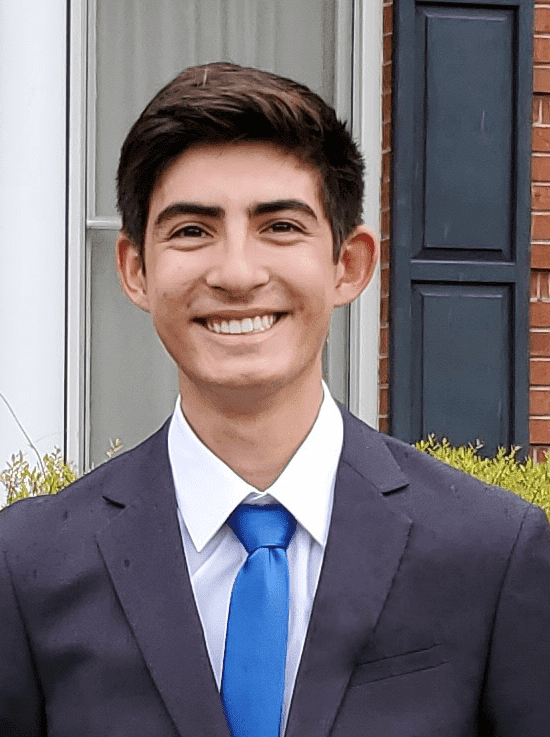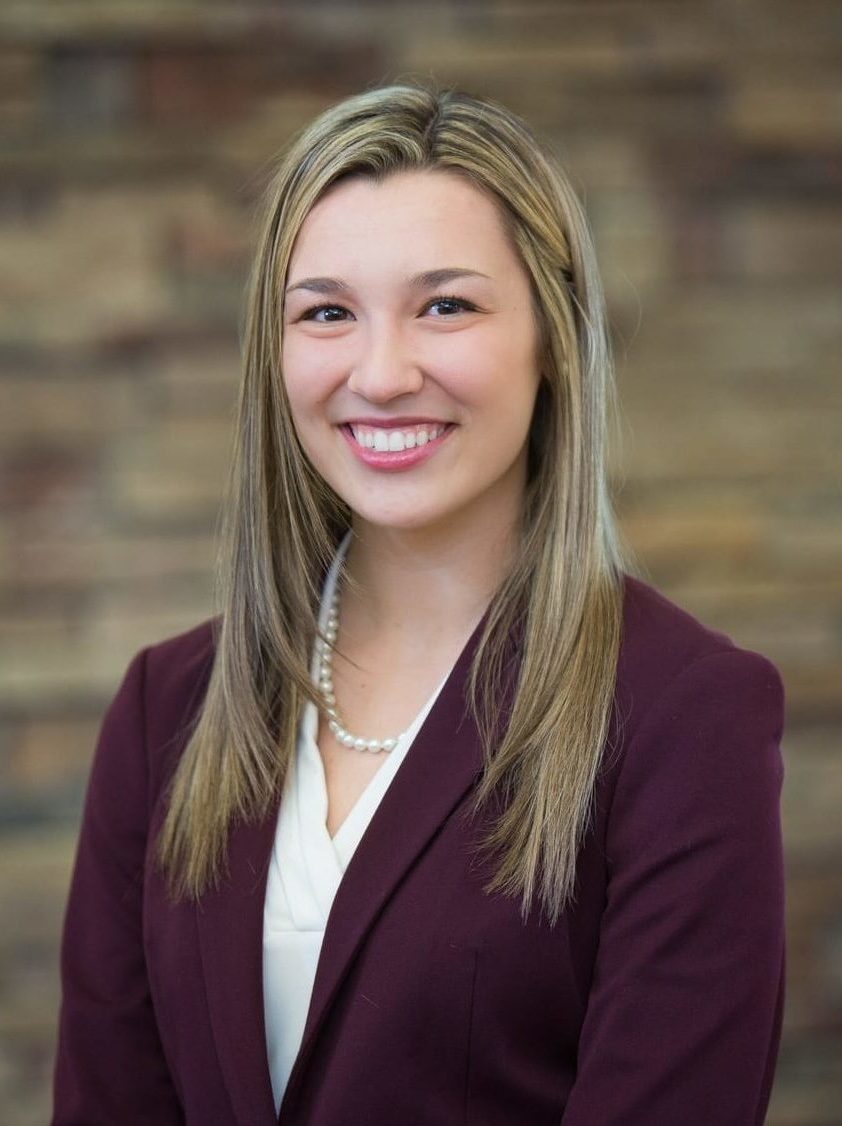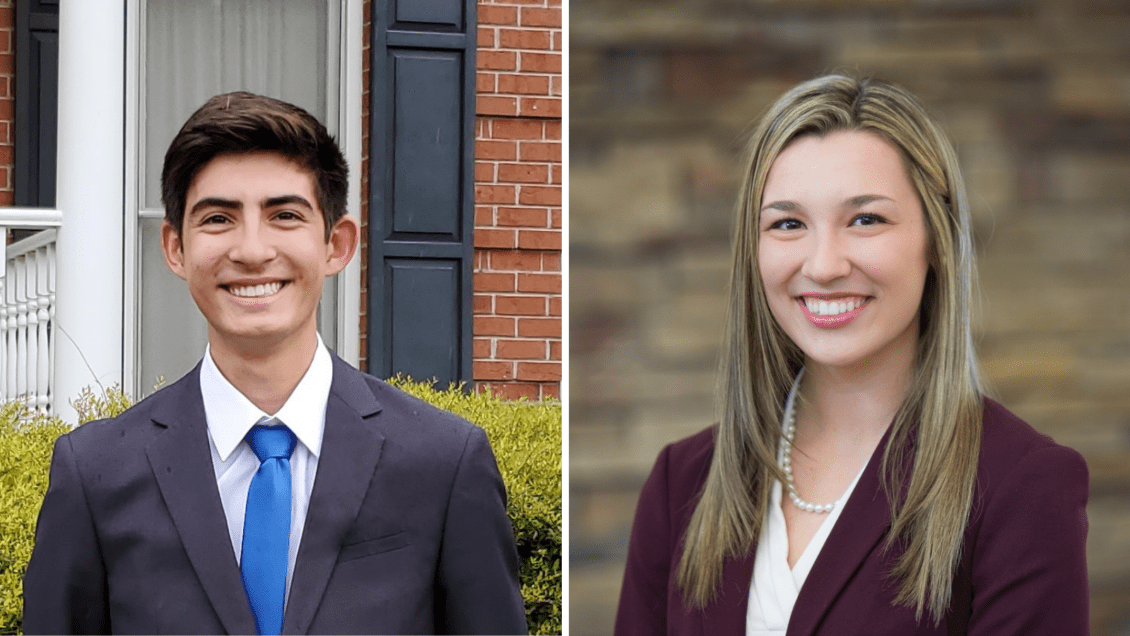Two College of Engineering, Computing and Applied Sciences undergraduates are recipients of the 2021 Barry M. Goldwater Scholarship, the premier and highly competitive national award for students who have the potential to advance research in mathematics, natural sciences and engineering.
The selection of computer engineering sophomore Gabriel Cutter and bioengineering junior Lauren Davis brings Clemson’s total number of Goldwater Scholars to 52. Both are members of the Clemson University Honors College.
In all, 410 students nationwide received scholarships this year. Recipients reveive scholarships of $7,500 for tuition, fees, books or room and board. They were selected from more than 1250 nominations from 438 schools. Typically universities may nominate only four students.
“We are preparing students to tackle some of society’s most complex and urgent problems, and I look forward to the contributions that Gabriel and Lauren will make in their fields,” said Anand Gramopadhye, dean of the College of Engineering, Computing and Applied Sciences. “I congratulate these outstanding students and their advisers, Pingshan Wang, Sarah Harcum and Melinda Harman for this national recognition and thank them for helping elevate Clemson’s academic prominence.”
Clemson’s recipients were among only 68 scholars chosen from engineering fields.
“This year’s Goldwater candidates faced unique challenges when their summer research experiences were canceled and they lost access to their labs for many months due to campus closures.”
Robyn Curtis, director of Clemson’s Major Fellowships Office.
“Both Lauren and Gabriel did a wonderful job of finding creative ways to continue working toward their research goals even when they could not be in their labs,” Curtis said. “I am extraordinarily proud of them not just for their accomplishments but for their resilience and determination.”
Gabriel Cutter, Computer Engineering
Cutter chose to focus his research on radio frequencies (RFs) because of their broad applications across all research fields. He’s interested in how they integrate all sectors of daily life, down to the electronics worn on wrists.

Cutter arrived at Clemson with an interest in computer engineering as a Bosch FIRST Scholar, a 4-year scholarship. He narrowed his focus to the effects of radio frequencies on humans the summer before his first year when he participated in the Honors College EUREKA! undergraduate research program.
Cutter began research with Pingshan Wang, professor of electrical and computer engineering, and Sarah Harcum, professor of bioengineering, in EUREKA! and has stayed in that lab ever since.
“The FCC’s guidelines for RF traffic were adopted from research largely conducted in the 1980s and have undergone little to no reform despite the emerging dominance of 5G mobile communications,” Cutter wrote in his application.
“That is where I get my sense of urgency for critical research in RF. I believe that it is our responsibility as computer engineers to advance the world forward, but at the same time with undeniable proof of safety.”
GABRIEL CUTTER
Twice Cutter’s summer 2020 research plans were canceled due to Covid — an international research program at Fudan University in China and a subsequent NSF-SURF program.
“Clemson does not typically nominate sophomores, but Gabriel’s resilience and continued progress toward his research goals was impressive,” Curtis said. He was one of only 56 sophomores selected nationwide.
Without access to a lab, he took three online classes and applied for an Honors College mini-grant for up to $500 to pursue an independent research project to produce a robot that could use Light Detection and Ranging LIDAR technology, which is commonly used in self-driving vehicles.
After modeling the robot virtually, he 3D printed everything and wired the electronics. He presented his work virtually to the Honors College at the end of the summer.
The Mount Pleasant, S.C. native will pursue a Ph.D. in computer engineering.
Lauren Davis, Bioengineering
Davis aspires to perform research to improve biomaterial properties of medical devices with the goal of creating implants that last a lifetime.

From a young age she was fascinated by the idea that human innovation can mimic the body. Her interest was heightened after her 5-year-old cousin was diagnosed with a congenital heart defect.
“I became fixated on the fact that such a common ailment could have been fatal for my little cousin,” Davis wrote in her application.
“This drove me to explore ailments that affect people on a global scale, and I became interested in researching the treatment of diseases and injuries and how treatment options differ in various cultures and regions.”
A 2019 summer internship at Medtronic confirmed her decision. While there, she volunteered in a hospital pediatric unit in a neighboring city with a large population of low-income families.
“After working with these children and their families, I now hold a greater respect for the biomedical research that solves usability issues that prevent treatment accessibility for patients in need.”
LAUREN DAVIS
Davis has worked with Melinda Harman, associate professor of bioengineering, in the CU-REPRO lab since her first semester at Clemson. The Lakeville, Minn. native plans to obtain a Ph.D. in biomedical engineering.
Davis is a Beckman Scholar and member of the Honors College, as well as the Most Outstanding Junior in Bioengineering. She is engaged in extensive campus activities including marching band and several service organizations.
She remembers being one of only two girls in AP Chemistry class. She faced comments from peers who suggested girls did not belong in labs. That memory motivates her to encourage young girls to pursue STEM-related fields. For example, she organized a hands-on activity with materials used in hip and knee implants for 30 middle school girls.
About the Goldwater Scholarships
The Barry M. Goldwater Scholarship and Excellence in Education Program was established by Congress in 1986. It honors Goldwater, who served 30 years in the U.S. Senate. The program encourages highly qualified students in the United States who are studying science, mathematics, or engineering. It identifies students who intend to pursue doctorates.
Read more about the 2021 competition results here: 2021 Goldwater Scholar Press Release
Students interested in applying for the Goldwater Scholarship and other nationally competitive awards, should contact the Office of Major Fellowships. Call 864-656-9704 or email fellowships@clemson.edu.
Get in touch and we will connect you with the author or another expert.
Or email us at news@clemson.edu

